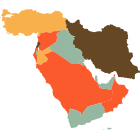Risk Analysis and Contingency Planning for Lebanon NCD Programs
Background
With the support of the Novo Nordisk Foundation and in partnership with the Lebanese Red Cross (LRC), the Danish Red Cross (DRC) embarked on a project in Lebanon to better prevent and respond to non-communicable diseases (NCDs). The LRC, the largest national humanitarian actor in Lebanon, provides unique humanitarian access and channels of communication with national stakeholders. Since 2013, DRC has partnered with LRC, focusing on health, psychosocial support, and cash-based assistance to Syrian refugees and vulnerable host communities.
DRC’s engagement in the NCD area has been driven by needs identified through small-scale pilot projects using evidence-based approaches. The main focus has been community-based prevention and care, mobilizing volunteers to promote healthy lifestyles, engage at-risk groups, and provide patient education and support. This project targets people displaced by the Syrian conflict, with a particular focus on youth, while also aiming to improve community-based prevention and essential health services for those at risk of severe NCDs. Given the ongoing socio-economic crisis and the COVID-19 pandemic, which has strained Lebanon’s public health sector, flexible operation modalities are essential. To ensure flexibility and adaptability, Triangle was commissioned by the DRC to conduct a thorough risk analysis, including scenarios and contingency plans.
Triangle’s Assignment
- Assessment of Risks: The project began by assessing the current risks related to security, economic, political, societal, and humanitarian factors affecting NCD programs in Lebanon. This comprehensive context analysis aimed to identify potential threats and vulnerabilities.
- Scenario Development: The analysis included the development of at least three different scenarios (most likely, second most likely, and worst case) covering the period 2020-2024. Each scenario assessed the identified risks and included corresponding mitigation measures and contingency plans tailored to the project.
- Mitigation Measures: For each identified risk, mitigation measures were proposed. These measures were designed to address both immediate threats and long-term challenges, ensuring the resilience of NCD programs in the face of various potential crises.
- Contingency Planning: Detailed contingency plans were created for each scenario, outlining specific actions and triggers for implementation. These plans aimed to provide clear guidelines on how to respond effectively to evolving situations.
- Monitoring and Implementation: The project developed a plan for monitoring risks and triggers for each scenario. This included regular reviews and updates to ensure the plans remained relevant and actionable in the changing context of Lebanon.
- Stakeholder Engagement: Engaging with key stakeholders, including government officials, healthcare providers, and community leaders, was essential to validate findings and ensure the proposed measures were practical and aligned with local needs.
- Capacity Building: The project emphasized the importance of building the capacity of local actors to implement and adapt the contingency plans. Training sessions and workshops were conducted to equip stakeholders with the necessary skills and knowledge.
- Documentation and Reporting: The final deliverables included a detailed report with a risk matrix specific to the Danish Red Cross’s NCD programs, scenario development, programmatic considerations, and recommendations. This report provided strategic insights and preparedness measures to enhance the resilience of NCD programs in Lebanon.
- Role of DRC and Responsibilities: The Danish Red Cross provided oversight and guidance throughout the project, ensuring alignment with broader humanitarian goals and national health strategies. Responsibilities included reviewing and validating the risk analysis, facilitating logistical support, and coordinating with Lebanese Red Cross partners to ensure successful implementation of the contingency plans.
Project:
Risk Analysis and Contingency Planning for Lebanon NCD Programs

Duration:
March 2021 – May 2021
Lebanon
